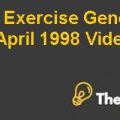
PROPOSED SOLUTION
MFS must proceed with the hedging fund business by forming its hedging operations into separate entity under the subsidiary of the MFS. The company must introduce the compensation model within this separate subsidiary of hedging fund that would bring the satisfaction to the MFS employees that by doing so it would not bring the affect on the MFS culture and reward program. The recommended compensation model is as similar as the previous performance model that MFS adopted but in this proposed model they should reduce the weight around 10-15%, which should be specified with the subjective evaluation and major portion of remaining weight should be allotted to objective evaluation with respect to the fund managers performances. This would motivate the managers and would also bring the satisfaction for hedge manager as they would be compensated with respect to their performances and it also satisfied them in terms of other company’s compensation program.
By creating the subsidiary hedge fund as separate business entity of MFS, it would also help the company in terms of leveraging the market creating the opportunity to earn a large portion of revenue without changing or opposing the current culture of the company. To come up with this proposed solution there were some decision factors, which helped in determining the solution and these factors were as follows:
1) The compensation model should be common to the entire fund manager with the general bonus pool such as the traditional compensation model, which includes the subjective evaluation.
2) For hedge fund manager there is the need of separate compensation model.
3) There must be the exit strategy.
4) MFS can also create the subsidiary company for the hedge fund and for them there should be separate compensation model and that company should involve their domestic institutional investment fund in this model.
OTHER REASONS THAT CONCLUDED THE PROPOSED SOLUTION
Company kept in my mind while several solutions:
In the 1990’s decade the hedge funds were growing rapidly in the market and for the company it generated large amount of revenues. Considering the Exhibit 1, given in the appendices section in the end of the report, it would be observed that company’s performance in 2000 was $147.4 billion has been decline to$121.7 billion in 2001. This means that company has to perform well to get its position back. It was common that a potentially hedge fund could bring about at-least $20 million of revenue. It also tells that, hedge fund could earn the company revenue even though equity market was not performing well.
In market point of view: Company was not possibly growing with respect to the revenue generation within its current business operation therefore MFS should go instantly into the hedge fund industry. At that period of time hedge market was growing rapidly, which would be the essence of growth for the Massachusetts Financial Service. Furthermore, hedge funds was bringing the revenue even when equity market was not performing well and keeping this point under consideration, the company eliminated the exit strategy from the proposed solution.
In compensation point of view: Normally hedge funds mangers were getting the compensation on the basis of percentage of assets that they were managing. Hedge funds were normally compensating the managers with respect to the performance by managing the hedge funds and these payments were paid on fixed as well as on performance incentive basis. Mutual funds generate revenue if the market was performing well but in the case of hedge funds, these were generating revenue on the intellectuality of the managers that what hedging strategy they used even though market was not performing well.
Company could pay the hedge fund manager under the traditional subjective compensative plan on the basis of subjective evaluation and on the general bonus pool it already had but in this situation hedge funds managers were not being paid for their performances and this would lead the fund’s managers to leave the company as it had been already observed that two managers who were also the top performer left the company to create their own firm......................................
This is just a sample partial case solution. Please place the order on the website to order your own originally done case solution.













